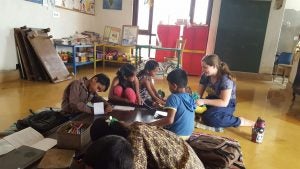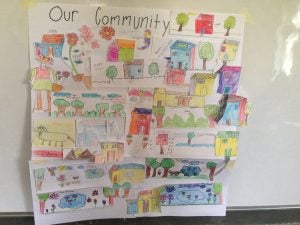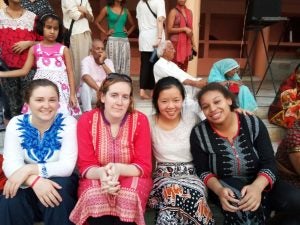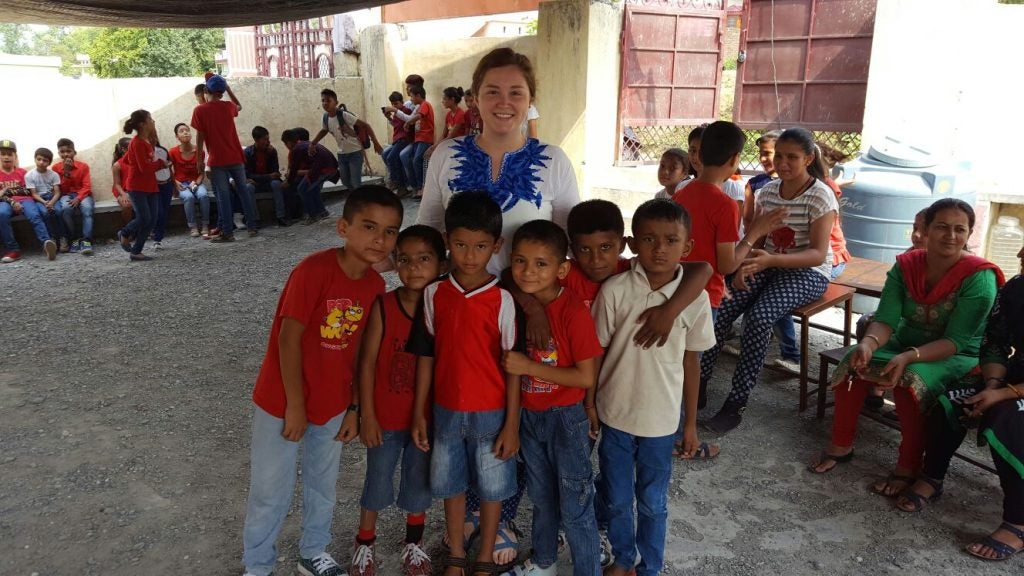By Katey Carey
Hi everyone! I’m Katey, a senior studying in LSA’s Program in the Environment and Urban Studies. Earlier this summer, I was very fortunate to spend two months outside Dehradun, India, as a teaching intern at the non-governmental organization (NGO) ANKURI (Agency for Non Konventional Urban Rural Initiatives). Along with three other college students from the US, I taught English to students of all ages in a few different villages outside Dehradun at their government schools, ANKURI’s Literacy Center, and at a three-week summer camp filled with crafts and games.

As the lead teacher for the second to fifth-grade students, I learned how to think on my feet and lead our teaching team through transitional moments in an organized way. In all three teaching locations, we were often under-resourced and our enrollment numbers fluctuated frequently, so we had to adapt the lessons we’d planned depending on how many students and materials we had each day. Additionally, depending on how the teaching sessions progressed, we had to totally scrap our original lesson plans and go with an alternative set of activities and games. Therefore, I developed an arsenal of games, books, and activities that could be used at a moment’s notice and communicate to my American and Indian co-teachers the change of plans calmly. I became a more flexible leader and also came to enjoy the challenge and nature of working in an ever-changing environment. I believe I developed really important leadership skills through this experience because the only constant in any work environment is change — in future jobs and internships, I’ll feel more comfortable navigating a team through situations in which we have to alter our original plans. I also enjoyed adjusting our lessons based on which students were present and which resources were available on a given day because I felt like we were addressing the individual needs of the students more accurately, rather than rigidly sticking to the lessons we planned.

Additionally, with the Indian government school teachers and students, I learned how to lead activities and create relationships using forms of communication outside of language. I don’t speak Hindi and the level of English comprehension varied greatly among those we met, so often, we communicated through song, dance, crafts, and movement instead of language. It was a beautiful experience to form close connections with others despite not being able to speak the same language. This alternative form of communication will also help my leadership abilities back on campus because, although I can communicate with most people in Ann Arbor using English, these other forms of communication are deeply personal and have helped me create closer emotional connections with others than I would have if I’d only been using language.
This internship has also allowed me to rethink leadership in terms of how leaders function in a team. Through this experience, each member of our team of American college students, Indian school teachers, and NGO workers had a different role. For example, I taught and developed lessons for the second through fifth-grade students and coordinated the arts and crafts activities for summer camp. Other team members taught and choreographed the song and dance activities for summer camp and another created lessons for the older group of students. We were all able to serve as leaders in different areas, at different times. In future teams and projects, I hope to continue this format of leadership because it made the group function in a more egalitarian manner and gave each of us a sense of pride and autonomy over our area of expertise, rather than having one or two people lead the entire group in a hierarchical structure.

On an organizational scale, this experience gave me new insights on NGO and non-profit leadership, which is a field that I’m interested in exploring after graduation. Our internship supervisor founded ANKURI, an NGO that aims to empower rural women through income generation, alleviate poverty, and promote health,
education and the full participation of women and children in Uttarakhand society (adapted from ankuri.org). Although initially I didn’t have a clear idea of the background and intentions of those operating ANKURI and was thus slightly skeptical of the organization, once I met Rachna – the founder and director of ANKURI – I felt more confident about the work ANKURI is doing in the area. Rachna is from a much higher social and economic class than most of the women and children ANKURI is intended to serve and she has funded most of the organization’s operations out of her own pocket; however, despite her many differences with those ANKURI serves, she lives among the community and has gained their trust and created close relationships with them over the years. Most importantly, Rachna wants the women and children to have autonomy over the decisions and functioning of the organization: rather than Rachna being the “face of ANKURI,” she wants to help establish a strong base for the operations of the organization and eventually transfer control of ANKURI to the village women. She has also established a local and international network of ANKURI supporters, utilizing a combination of different funding sources and resources to keep the organization functioning. As someone who wants to work with non-profits and grassroots organizations after college, learning about Rachna’s different approaches to funding, resourcing, operating an NGO, and the theory of change behind ANKURI will be valuable when thinking about the various ways organizations can function in the non-profit world.
education and the full participation of women and children in Uttarakhand society (adapted from ankuri.org). Although initially I didn’t have a clear idea of the background and intentions of those operating ANKURI and was thus slightly skeptical of the organization, once I met Rachna – the founder and director of ANKURI – I felt more confident about the work ANKURI is doing in the area. Rachna is from a much higher social and economic class than most of the women and children ANKURI is intended to serve and she has funded most of the organization’s operations out of her own pocket; however, despite her many differences with those ANKURI serves, she lives among the community and has gained their trust and created close relationships with them over the years. Most importantly, Rachna wants the women and children to have autonomy over the decisions and functioning of the organization: rather than Rachna being the “face of ANKURI,” she wants to help establish a strong base for the operations of the organization and eventually transfer control of ANKURI to the village women. She has also established a local and international network of ANKURI supporters, utilizing a combination of different funding sources and resources to keep the organization functioning. As someone who wants to work with non-profits and grassroots organizations after college, learning about Rachna’s different approaches to funding, resourcing, operating an NGO, and the theory of change behind ANKURI will be valuable when thinking about the various ways organizations can function in the non-profit world.
I’m immensely grateful for the financial support of the Barger Leadership Institute and Kelly and Mary Jean Jecklin – without them, I wouldn’t have been able to have such an influential and memorable experience interning abroad. I thank Rachna and her family for being such wonderful hosts and mentors. Lastly, thank you to the women and children of ANKURI and all of our students and co-teachers for welcoming us into their community.




